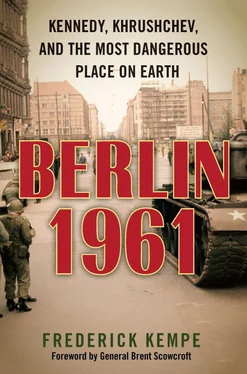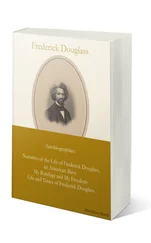reluctance to discuss
security commitment to
televised Oval Office speech on
visit to
Cuba, Bay of Pigs invasion
acknowledgment of error
demonstration of weakness
failure of mission
linking to Berlin issue
miscalculations and oversights
plan
pretext of U.S. noninvolvement
Cuban Missile Crisis
de Gaulle and
death
drug use
East Berlin, on Soviet control of
East German border closure
acquiescence to
Checkpoint Charlie confrontation
inaction on
on military escort for U.S. vehicles
on prospect of
relief at
Eisenhower
on Berlin issue
on Kennedy’s leadership ability
Kennedy’s opinion of
on Laos
on nuclear war
election (1960)
inauguration and inaugural address
Khrushchev’s role in
margin of victory
Nixon–Kennedy debates
German reunification
first mention of
lack of commitment to
skepticism about
health
Khrushchev
back-channel communications with
confidential correspondence with
Kennedy’s mistrust of
on Kennedy’s weakness
misinterpretation of motives of
role in Kennedy’s election
ultimatum to Kennedy
military buildup
concern at cost of
defense spending
reinforcement of Berlin garrison
test launch of intercontinental ballistic missile
nuclear capability
call for disarmament
disclosure of details
fear of war
military instructions to NATO
nuclear testing
test ban proposal
war planning
political standing
popularity
on racial tensions in U.S.
self-assessment
Soviet policy, ambivalence on
spy-flight ban over Soviet territory
Vienna Summit
advance preparations through intermediary
agreement to meeting
arrival and first encounter with Khrushchev
casual conversation
on communism
on Cuba
disadvantage at outset
invitation to Khrushchev
on Iran
on Laos
on nuclear test ban
on permanent division of Berlin
poor performance
preconditions for
references to West Berlin
womanizing
youth and inexperience
Kennedy, Robert “Bobby”
back-channel communications, arrangement of
on Checkpoint Charlie confrontation
failure to document
on upcoming Vienna Summit
Berlin deliberations
concession on withdrawal of missiles from Turkey
KGB meeting on U.S. policy
pressure on, for early Kennedy–Khrushchev meeting
on Soviet nuclear testing
Kharlamov, Mikhail
Khrushchev, Nikita
background
captive U.S. airmen, release of
communist ideology
conciliatory gestures
on Cuban invasion by U.S.
Cuban Missile Crisis
ability to strike U.S. targets
Kennedy’s weakness in
linking to Berlin issue
nuclear buildup
retreat
surprise at Kennedy’s resolve
death
domestic shortfalls and failures
East German border closure
approval of
Checkpoint Charlie confrontation
Clay’s plans to breach
plans for
proposal to Warsaw Pact states
restriction of operation to East German territory
satisfaction with
East Germany
economic assistance to
exodus of refugees
proposal for treaty granting control of access
Eisenhower
Camp David meeting
lack of respect from
Paris Summit
ultimatum to
on “free city” status for Berlin
on German reunification
on Germany’s frontier and revanchism
on Iran
Kennedy
back-channel communications with
confidential correspondence with
on early negotiations with
impatience with
negotiation positions
perceived weakness of
role in election of (1960)
ultimatum to
Laotian policy
linking of Cuban and Berlin issues
Mao, strained relations with
military buildup
military cuts
NATO, threats against
nuclear testing and capability
ouster from power
peaceful-coexistence policy
physical features
political standing
popularity
Potsdam accord, intention to abrogate
psychological makeup
repressive measures
Siberian science city
space program
Stalinism, repudiation of
UN, outburst at
UN, proposals about involvement in Berlin negotiations
leadership vacancy
protection of West Berlin
on U.S. U-2 spy mission
Vienna Summit
agreement to meet
arrival at and first encounter with Kennedy
casual conversation
on communism
control of conversation
on Cuba
determination to discuss Berlin
on Iran
on Laos
on nuclear test ban
report on outcome
threat to sign treaty with East Germany
on West German importance to Soviet economy
Khrushchev, Sergei
concern for N. Khrushchev’s health
on N. Khrushchev’s intentions about nuclear strike
on N. Khrushchev’s preoccupation with Germany
on N. Khrushchev’s satisfaction with border closure
on threat to demilitarize West Berlin
Kissinger, Henry
alternative Berlin plan
on Berlin issue
as White House consultant
Kohler, Foy
Berlin deliberations
on border-crossing escorts
order for retreat from Checkpoint Charlie confrontation
Konev, Ivan
demand for end of Autobahn patrols
doubts about loyalty of East German forces
intelligence on U.S. preparation for hostilities
job responsibilities
on U.S. tanks at Checkpoint Charlie
World War II service
Korolyov, Sergei
Kosygin, Alexei
Kozlov, Frol
Kramer, Erwin
Kreisky, Bruno
Kroll, Hans
Krone, Heinrich
Kulbeik, Helmut
Kuznetsov, Vasily
Kvitsinsky, Yuli
Lamphir, Bob
Laos
as base for attacks on South Vietnam
communist goals in
Geneva conference on
Macmillan’s recommendation on
neutrality agreements on
as test case for Berlin
Lawford, Peter
Lazai, Hans-Joachim
Lazarev, Colonel
Leibing, Peter
LeMay, Curtis E.
Lemmer, Ernst
Lemnitzer, Lyman
Leonhard, Wolfgang
Leuschner, Bruno
Lightner, Dorothy
Lightner, E. Allan, Jr.
anticommunist stance
defiance of border procedures
and first report of border closure
on show of resolve in Berlin
as West Berlin diplomat
Lincoln, Evelyn
Lippmann, Walter
Litfin, Günter
Lochner, Robert H.
Lodge, Henry Cabot, Jr.
Los Angeles Times
Lünser, Bernd
Macmillan, Harold
acquiescence to border procedures
on Adenauer’s response to border closure
Berlin strategy
“Grand Design” proposal
on Kennedy’s youth and character
on Khrushchev’s linking of Berlin and
Cuban issues
on negotiations with Khrushchev
offer to mediate with Khrushchev
relationship with Kennedy
on Soviet demands at Vienna Summit
Malenkov, Georgy
Malinovsky, Rodion
Mansfield, Mike
Mao Tse-tung. See China
Maron, Karl
Matern, Hermann
Mautner, Karl
McCart, Sam
McCord, Thomas
McGrory, Mary
McHugh, Godfrey
McIntyre, William T.
McKone, John
McNamara, Robert
Berlin deliberations
on Checkpoint Charlie confrontation
on Soviet declaration of missile expansion
war planning
Mende, Erich
Menshikov, Mikhail
Mielke, Erich
Mikoyan, Anastas
Molotov, Vyacheslav
Muller, George
Murphy, David
Murrow, Edward R.
Читать дальше











